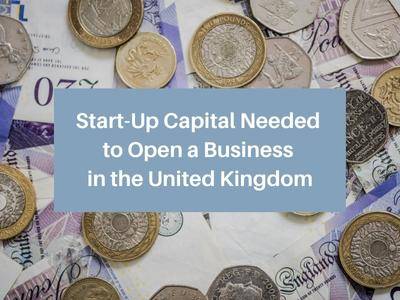Start-Up Capital is Needed to Open a Business in the United Kingdom

Capital is the amount of funding your business needs to get started. Aside from number-crunching, there are other matters to consider, as well. If you’re wondering about how much start-up capital is needed to open a business in the United Kingdom, then wonder no more.
Hoping for the Best, Planning for the Worst
It is quite doable to keep your budget really tight and lean. Opting to work remotely and choosing organic marketing strategies are viable alternatives. However, it is still essential to know how to budget for a business.
Budgeting to start a business is important but to survive and be successful, a budget should include long-term survival plans. By being financially prepared, your business can enjoy better fiscal health. A strategic and astute start-up capital calculation will:
- Clearly show what your business can and cannot afford such as extra staff, equipment, etc.
- Ensure investor and shareholder confidence.
- Consider the need for alternative funding options.
When calculating start-up capital, it is prudent to budget for more by factoring in potential costs. Company structure and formation, as well as human resource, are factors that will need to be considered. You should also be conversant on how to streamline the accounting process. If you are unsure, firms such as 3E Accounting offer budget-friendly customisable packages that can be of great help.
Some of the types of costs that will pop up in your capital budget include:
- Fixed costs
- Variable costs
- One-off costs
- Essential and Optional costs
The most significant drain on your start-up capital budgeting will be what is known as ‘sunk costs’. These are initial and essential expenses that need to be spent, but the return on investment is next to zero. They include:
- Business registration, whether you do it yourself or hire an agency.
- Consultancy or professional fees, which includes legal work, recruitment, etc.
- Office supplies such as furniture, stationery, etc.
- Brand awareness, such as logo and website design, banners, etc.
The opposite of a sunk cost comes in the form of asset expenditure which retains, and in some instances increases their value. Further, HMRC has an annual investment allowance (AIA). This allows you to deduct the full value of certain types of assets from your profits before paying tax.
You will also need to factor in the following when drawing up your budget:
- Permits and licenses
- Payroll
- Business insurance
- Inventory
- Market research
- Software
Statistics indicate that the average business in the United Kingdom will need between GBP5,000 to GBP12,000 to launch. Studies also show that the first year usually has companies spending approximately GBP20,000.
It is possible to secure a start-up loan or grant from the British Small Business Grants, Government agencies, etc. Crowdfunding and angel investors are another viable option but may require equity in the business. There are also bank loans, but these need collateral and interest may be high.
3E Accounting can help you work out exactly how much start-up capital is needed to open a business in the United Kingdom. We offer innovative business solutions that can be customised to fit your budget. Along with our affiliates and partners, 3E Accounting strives to provide business excellence combined with international experience and expertise. Contact 3E Accounting today and let us guide you towards the best business outcomes possible.

